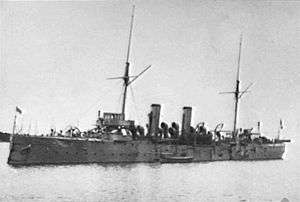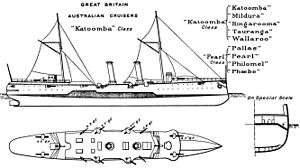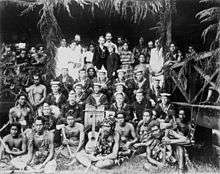HMS Tauranga (1889)
For other ships with the same name, see HMS Phoenix.
 HMS Tauranga, Tasmania in 1902. | |
| History | |
|---|---|
| Name: | HMS Phoenix |
| Builder: | J & G Thomson, Glasgow |
| Launched: | 28 October 1889 |
| Renamed: | Tauranga, 1890 |
| Fate: | sold in July 1906 for breaking up. |
| General characteristics | |
| Class and type: | Pearl-class cruiser |
| Displacement: | 2,575 tons |
| Length: | |
| Beam: | 41 ft (12 m)[1] |
| Draught: | 15 ft 6 in (4.72 m) |
| Installed power: | 7,500 ihp (5,600 kW) on forced draught |
| Propulsion: |
|
| Speed: | 19 knots (35 km/h; 22 mph) |
| Complement: | 217 |
| Armament: |
|
| Armour: |
|
HMS Tauranga was a Pearl-class cruiser of the Royal Navy. The vessel was originally named Phoenix and built by J & G Thomson, Glasgow. She was launched on 28 October 1889.[2] Renamed on 2 April 1890, as Tauranga as part of the Auxiliary Squadron of the Australia Station. She arrived in Sydney with the squadron on 5 September 1891. During the Samoan civil war in 1899, she took part in operations with HMS Porpoise and HMS Royalist.[2] Spending between 1901 and 1903 in reserve at Sydney before being assigned to the New Zealand division of the Australia Station. She left the Australia Station on 14 December 1904. She was sold for £8500 in July 1906 to Thomas Ward for breaking up.[2]

A Pearl-class cruiser from Brassey's Naval Annual, 1897
Notes
References

Robert Louis Stevenson, his family and Samoans, and the band of HMS Tauranga at Vailima (Samoa) (photo by Alfred John Tattersall).
- Bastock, John (1988), Ships on the Australia Station, Child & Associates Publishing Pty Ltd; Frenchs Forest, Australia. ISBN 0-86777-348-0
- Winfield, Rif & Lyon, David (2004). The Sail and Steam Navy List: All the Ships of the Royal Navy 1815–1889. London: Chatham Publishing. ISBN 978-1-86176-032-6. OCLC 52620555.
This article is issued from Wikipedia - version of the 1/8/2016. The text is available under the Creative Commons Attribution/Share Alike but additional terms may apply for the media files.